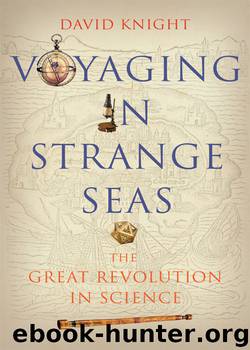Voyaging in Strange Seas by David Knight

Author:David Knight
Language: eng
Format: epub
ISBN: 9780300173796
Publisher: Yale University Press
Graunt's patron, whose influence in his work was strong and to whom it was sometimes attributed, was William Petty (1623–87). The son of a draper, he had gone to sea, landed up in Normandy in 1637 and attended the Jesuit College in Caen; he returned thence to England, but on the outbreak of the Civil War went to Leiden to study medicine, and on to Paris where he met Hobbes, Gassendi and Mersenne. In 1646, back in Oxford, Petty completed his medical studies and in 1651, in good odour with the new regime, became professor of anatomy. As he began to dissect Anne Greene, hanged in Oxford, his actions instead resuscitated her; in consequence he achieved great fame, fellowship of the College of Physicians and a readership at Gresham College. In 1652 he was appointed physician to Cromwell's army in Ireland, and in 1654 his proposals to use teams of soldiers to map the conquered lands for redistribution were accepted. The results of this ‘down survey’ did not please everyone, but they enriched Petty, who acquired enormous estates. He became a member of the English and Irish parliaments, was a founder of the Royal Society and, having made peace with the restored Stuart government, was knighted in 1661. He was first president of the Dublin Philosophical Society, founded in 1661, and designed a catamaran, which unfortunately capsized in a great storm. His maps of Ireland were published in 1685, and he collected enormous quantities of data about Ireland and England for analysis, some of it published in his posthumous Political Arithmetic (1690). His son became Lord Shelburne (1737–1805), and another descendant became prime minister and patron of Joseph Priestley.
Petty's life showed how far a medical man with energy, charm and an eye on the main chance might get; and how important statistics were becoming to rulers grasping just how little they knew about the countries and people they governed. This opened up useful territory for applied mathematicians. Analysis of risk was essential for the modern banking and financial services that began in the Netherlands and came to London at the end of Petty's lifetime; and in particular vital statistics were crucial for life insurance and annuities. Huygens had in 1657 supplemented such empirical, inductive statistics by deductive analyses of games of chance. British baptism and funeral records were too patchy for accurate computations, so Halley in his actuarial calculations used more reliable data from Breslau for 1687–91, hoping they were comparable. This pioneering work was taken up by Abraham de Moivre in his Doctrine of Chances (1711, 1738 and 1756). Another exile, a French Protestant educated in Saumur, he fled the country when the Edict of Nantes was revoked in 1685, and in Britain became a protégé of Halley and Newton. He derived better formulae for insurance calculations, anticipated the law of large numbers, and was an important figure in the wider paradoxical effort to find the laws of chance: but the great age of ‘lies, damned lies, and statistics’ would be the nineteenth century.
Download
This site does not store any files on its server. We only index and link to content provided by other sites. Please contact the content providers to delete copyright contents if any and email us, we'll remove relevant links or contents immediately.
| Africa | Americas |
| Arctic & Antarctica | Asia |
| Australia & Oceania | Europe |
| Middle East | Russia |
| United States | World |
| Ancient Civilizations | Military |
| Historical Study & Educational Resources |
Cecilia; Or, Memoirs of an Heiress — Volume 1 by Fanny Burney(32553)
Cecilia; Or, Memoirs of an Heiress — Volume 2 by Fanny Burney(31951)
Cecilia; Or, Memoirs of an Heiress — Volume 3 by Fanny Burney(31935)
The Secret History by Donna Tartt(19066)
Sapiens: A Brief History of Humankind by Yuval Noah Harari(14376)
Leonardo da Vinci by Walter Isaacson(13322)
The Radium Girls by Kate Moore(12022)
Sapiens by Yuval Noah Harari(5367)
How Democracies Die by Steven Levitsky & Daniel Ziblatt(5217)
The Wind in My Hair by Masih Alinejad(5093)
Homo Deus: A Brief History of Tomorrow by Yuval Noah Harari(4911)
Endurance: Shackleton's Incredible Voyage by Alfred Lansing(4774)
Man's Search for Meaning by Viktor Frankl(4589)
The Silk Roads by Peter Frankopan(4528)
Millionaire: The Philanderer, Gambler, and Duelist Who Invented Modern Finance by Janet Gleeson(4473)
The Rape of Nanking by Iris Chang(4209)
Joan of Arc by Mary Gordon(4105)
The Motorcycle Diaries by Ernesto Che Guevara(4093)
Stalin by Stephen Kotkin(3961)
